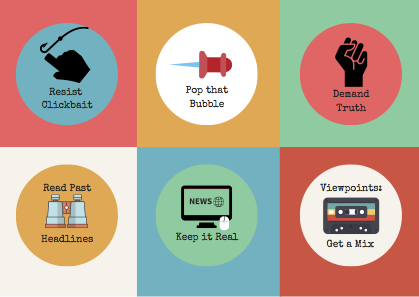Civic Online Reasoning
News literacy is said to be the acquisition of critical-thinking skills for analyzing and judging the reliability of news and information, differentiating among facts, opinions, and assertions in the media we consume, create, and distribute.
The term media literacy is synonymous with news literacy.
News literacy is best taught in cross-curricular, inquiry-based formats, and at all grade levels.
The Stanford History Education Group released a free curriculum called Civic Online Reasoning (COR). COR is modeled after methods used by professional fact-checkers. The COR curriculum provides free lessons and assessments that help librarians and other types of educators teach students to evaluate online information that affects them, their communities, and the world.
The evaluation process is based on three main questions:
Who is behind the information?
What’s the evidence?
What do other sources say?
What’s the evidence?
What do other sources say?
COR also encourages reverse image search - an online skill to evaluate and discover the origins of online images. Access COR's lessons about reverse image searching.
DIG A LITTLE DEEPER
Fighting the Infodemic: New Strategies for News Literacy (article)Strengthening Civil Society through First Amendment & Media Literacy Education (website)
Disclaimer: The South Dakota State Library does not endorse any service, product, or recommendation listed in this post.

